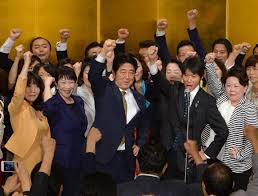 www.blogs.yahoo.co.jp
www.blogs.yahoo.co.jp One surprise from this particular ballot was the fact that a previous challenger to Abe, Ishiba Shigeru, chose not to run against the incumbent PM. This apparently came as a disappointment to many of his supporters in his home prefecture of Tottori (J), but then again perhaps there was method in Ishiba’s reticence. As Regional Development Minister, Ishiba comes into frequent contact with those regional representatives and voters who have proven crucial in past elections to securing the prime ministership. With Abe’s position currently unassailable, and given the fact that the security bills on collective self defence have polarised public and party opinion, Ishiba might have regarded it wiser to bide his time, exercising influence on the LDP members, and slowly working his way towards the leadership.
This does appear to be what Ishiba has chosen to do, with news coming out on Wednesday that Ishiba had moved to create his own faction within the LDP with a membership of around 20 to 30 previously unaffiliated MPs (J and J). This is without doubt a consequence of Abe’s unopposed election, for if Ishiba (who was previously unaffiliated with any faction) learned anything from his experience in 2012, it was that Abe has most LDP factions under his control, hence if one wishes to promote oneself as a leader one better have enough inter-party support to make it happen. Forming your own faction is one way to do this, and Ishiba has taken the first steps towards making himself a possible alternative to the entrenched LDP powerbase personified by the figures of Abe, Aso, and the like.
In the meantime Abe’s re-election means that the entire question of the security bills will continue to dominate the media cycle in Japan for a few weeks yet. The extended ordinary session of the Diet ends on September 27th, and all indications are that the Abe government intends to have the bills passed by the Upper House as of Wednesday the 16th. On this occasion, the government does not intend to use the so-called “60 day rule” (whereby if legislation introduced and passed by the Lower House is subsequently sent to the Upper House, yet the Upper House cannot reach an agreement on it after a period of 60 days, the legislation returns to the Lower House and passes into law), although they haven’t completely ruled it out using it either (J).
A real test of Abe’s leadership will come if and when the security legislation is made law. With constitutional scholars pointing to the illegality of the legislation and protests occurring across the length and breadth of Japan in opposition to the government’s plans, not forgetting to mention opinion polls that reveal a general confusion among the public about the bills and whether they are appropriate for Japan, the passage of the bills could instigate protest actions of a type not seen in Japan in two generations. However the reality of Japan’s current security situation and the positive reaction that the bills have garnered from Japan’s ally the US and closer affiliates in the region might take some of the wind out of the protestors’ sails.
Time and again Abe has pointed to the encroachment on Japanese territory by Chinese government aircraft and vessels and the need for Japan to play a more active role in security operations in the region and further afield, and has used these two factors as evidence that the time has come for Japan to assume the responsibilities that accompany Japan’s global status as a financial powerhouse and stable, democratic nation defending the rule of law. He is, in a sense, trying to match the expectations of other nations while also challenging the Japanese citizenry to adopt a more ‘real politik’ view of their current circumstances and how the nation must adapt or risk being isolated against a rising China. Not surprisingly, he has run into opposition to this plan, especially as some believe that the SDF is perfectly adequate of defending Japan without the need to become involved in overseas operations, especially not operations that might result in casualties.
So the security bills are a kind of battle of wills – that of the government versus those of the protestors and nearly all of the opposition parties in the Diet. On this issue, PM Abe may have the upper hand. Voter apathy was the reason Abe was re-elected at the end of last year, and that same apathy has allowed the LDP/Komeito government to pass legislation that might otherwise become bogged down in negotiations with effective opposition parties. The absence of such parties, and the apathy that brought this about, is thus a kind of self-fulfilling prophecy. A weak opposition, and voter disinterest in politics, have given Abe the keys he needs to bring about a fundamental shift in Japan’s security position. What he then does once the shift has occurred, however, is where things will get really interesting.
 RSS Feed
RSS Feed